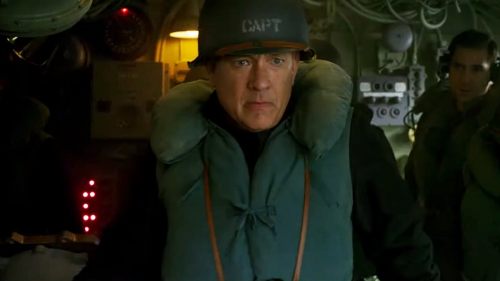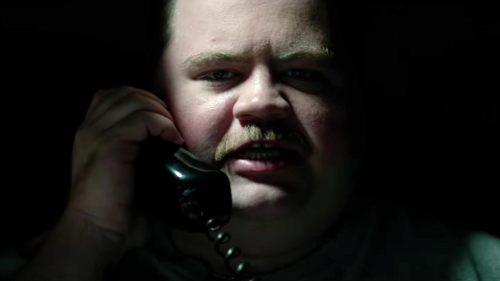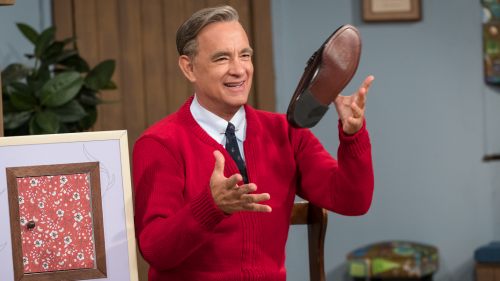SULLY Review: A TV Movie Crashes Into Oscar Season
It takes a particular worldview to make the NTSB - the National Transportation Safety Board - the bad guy of a plane crash movie, but Clint Eastwood, the empty chair lecturer and Donald Trump voter, has just such a worldview. And so a movie that purportedly celebrates the web of heroism that showed the best of New York City on a cold January day when a US Airways plane landed on the Hudson River ends not with the triumph of the dozens who came together to rescue the hundreds but rather with a row of NTSB bureaucrats saying “Captain Sully Sullenberger it is we, the eggheads and desk jockeys, who are the poopie heads, not you, the real white man who landed his plane on the water so heroically.”
It’s too bad, because I really wanted to start my review with this quote from Mr. Rogers:
“When I was a boy and I would see scary things in the news, my mother would say to me, "Look for the helpers. You will always find people who are helping.”
That is, on some level, what Sully thinks it’s about. But the movie can’t get past the idea that the NTSB would dare - would have the gall! - to investigate whether or not the actions that Captain Chesley Sullenberger took that morning were the right ones. And so it takes what was an interesting internal struggle - Sully himself waking up the day after the landing wondering if he did the right thing, if he’s a false hero, if he could have made it to LaGuardia after all - and makes it a cartoonishly exterior struggle, where he has to prove himself against the wicked NTSB guys who have maybe never even seen the inside of an airplane, let alone wrestled with God Himself in the heavens, as the cherished Sully Sullenberger has done.
What’s weird is that the movie makes such a big deal out of the idea that Sully was just doing his job, a truly admirable stance for a man to take when the world is throwing itself at his feet. But then why can’t the script by Todd Komarnicki wrap its head around the idea that the NTSB is doing its job as well? As the film rolls into its final scenes it takes on the stodgy beats of a Rugged Individual against The System story, and it just doesn’t fit what the rest of the movie was trying to be, which is a story about everyday heroism, about a world where you do your job and do it well and that’s what saves lives. Philosophically the film’s middle section, where disparate New Yorkers all come together to work as a selfless unit to save the 155 passengers and crew of that plane, clashes with the final scenes, where the man must stand alone and defend himself against the jealous claws of the government. I like the movie about coming together. The one that rails against regulatory and safety agencies? I like it much less.
I would have had less time to consider this if Sully had been a particularly good movie. It’s technically short but it feels overlong, as the famous water landing (I’m avoiding the word crash here because they make such a big deal out of it in the movie) is revisited again and again - either as dream scenes where Sully doesn’t pull it off, or in a lengthy two-part recration of the incident. Most of the movie takes place in hotel rooms and hotel conference rooms, drab and uninteresting locations that give the film an authentic blandness. It looks like an episode of Star Trek: The Next Generation up in this joint.
Clint Eastwood directs the film with a stolid, almost stultifying hand. It’s shocking when the movie goes to its CGI plane sequences, all of which were clearly storyboarded and created outside of his purview, as these sequences sometimes move or have energy. Sully plods along in a low energy state, at first as dazed as its hero after his incident. But the film never comes to life, never finds a heartbeat, and it plays out like the kind of TV movie you might leave on in the background as you fall asleep on the couch, all greys and beiges on screen and mumbling phone conversations as soundtrack. Even the big crash isn’t all that loud or jarring; you’d probably sleep right through it.
The pity of the movie is that the somnambulance on screen leaves Tom Hanks high and dry. He’s playing a man who is dealing with the earliest stages of PTSD and is riddled with self-doubt. Sully is already the sort of guy who isn’t very demonstrative, but the landing makes him even more interior. Hanks finds this, and he is great at it, and the fact that we know him as an exuberant, happy actor makes Sully’s ashen-faced grimness all the more intense. But that work all gets lost in the dullness of the movie; Hanks’ tone is drowned up by the thrumming of the beigeness of the rest of the film. His note is lost in the drone.
Sully could be seen as something of a comeback for Eastwood, if only because nothing he has directed in the previous decade has been worth a damn. Sully at least reaches levels of technical competence that American Sniper and J. Edgar never did, and the movie’s dependable dullness certainly beats the jagged mess of Jersey Boys. The movie is, unlike the horrible Changeling, basically watchable. But it’s a mediocrity at best, a movie that squanders a story much more interesting than the headlines would have you believe. In many ways Sully’s story - rocketing to fame overnight, not being sure he deserves it - is one of the modern digital media age. But Clint doesn’t seem to understand that, and instead he settles on almost Randian ideals. Just let Howard Roark land his plane wherever the hell he pleases, you parasites.



